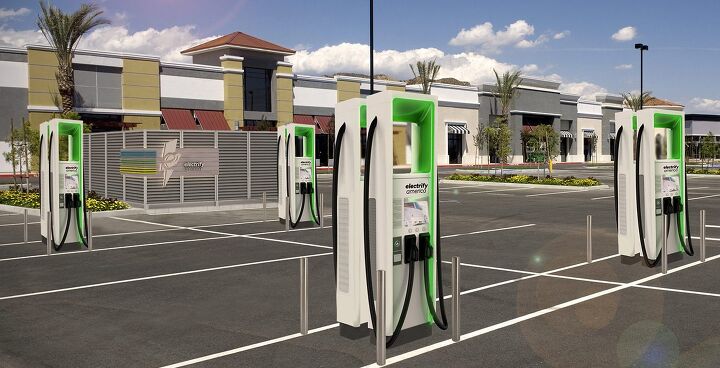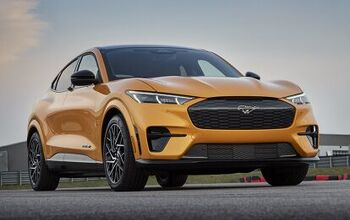Don't Lose Sleep Waiting for Volkswagen's Super-cheap EV

As Volkswagen Group embarks on its quest to build and disseminate The People’s Propulsion across the globe, rumblings of an ultra-cheap electric car from the automaker have come into focus.
We began hearing of such a vehicle last year, when reports emerged that VW was planning an EV with an MSRP below 20,000 euros (roughly $22,400 USD). That’s below the expected price floor of even the lowliest MEB-platform I.D. model — the I.D. Neo, which starts production in Europe late this year.
Now, the automaker has revealed where it sees this vehicle fitting into VW Group’s vast lineup, and when it might appear.
Think low-end. VW’s Seat brand — the pride of Spain — will be that bargain basement greenie’s home when it rolls out, probably in 2023, claims the brand’s CEO.
Speaking to the Financial Times, Luca de Meo said Seat will carry the torch for cheap electrics in the European market, rolling out a slew of electrified models to battle the likes of Nissan and Renault in the low-cost green field. Joining those future models will be the new, cheapest EV, built atop a sub-MEB platform.
“We spent so many years trying to fix our things so we couldn’t afford to get into the hottest and most innovative areas,” de Meo said of Seat’s recent return to profitability. “Now, because we are not busy with a fire brigade emergency, we can actually look a little bit more on the horizon.”
Seat will lead the new EV architecture’s development, apparently, with other VW Group brands adopting it for their own low-cost offerings. While we’re certainly not going to see a Seat offered in this market, a VW-badged model isn’t out of the question. A 21st-century green people’s car, perhaps — assuming the market looks sufficiently receptive to VW brass. Its appearance would only come after the North American market gets a taste of the automaker’s larger I.D. models, which include a crossover and a microbus.
Volkswagen CEO Herbert Diess wants Seat to take on more responsibility beneath the corporate umbrella. Diess told de Meo as much during a meeting last week.
“It’s a recognition that we can play a different role in the group,” de Meo said.
While fielding the cheapest EV on the market would be a coup for Seat (the Smart brand might pose a challenge to that boast), not everyone’s impressed by the plan.
Arndt Ellinghorst, head of global automotive research at Evercore ISI, told FT it would be “impossible to make money” on a model at that price point using today’s battery technology.
“In terms of innovating, it’s the right step,” he said. “But I would try to not lose too much money on it. They don’t have the pricing power of Audi or VW.”
[Image: Electrify America/Volkswagen Group]

More by Steph Willems
Latest Car Reviews
Read moreLatest Product Reviews
Read moreRecent Comments
- Kjhkjlhkjhkljh kljhjkhjklhkjh A prelude is a bad idea. There is already Acura with all the weird sport trims. This will not make back it's R&D money.
- Analoggrotto I don't see a red car here, how blazing stupid are you people?
- Redapple2 Love the wheels
- Redapple2 Good luck to them. They used to make great cars. 510. 240Z, Sentra SE-R. Maxima. Frontier.
- Joe65688619 Under Ghosn they went through the same short-term bottom-line thinking that GM did in the 80s/90s, and they have not recovered say, to their heyday in the 50s and 60s in terms of market share and innovation. Poor design decisions (a CVT in their front-wheel drive "4-Door Sports Car", model overlap in a poorly performing segment (they never needed the Altima AND the Maxima...what they needed was one vehicle with different drivetrain, including hybrid, to compete with the Accord/Camry, and decontenting their vehicles: My 2012 QX56 (I know, not a Nissan, but the same holds for the Armada) had power rear windows in the cargo area that could vent, a glass hatch on the back door that could be opened separate from the whole liftgate (in such a tall vehicle, kinda essential if you have it in a garage and want to load the trunk without having to open the garage door to make room for the lift gate), a nice driver's side folding armrest, and a few other quality-of-life details absent from my 2018 QX80. In a competitive market this attention to detai is can be the differentiator that sell cars. Now they are caught in the middle of the market, competing more with Hyundai and Kia and selling discounted vehicles near the same price points, but losing money on them. They invested also invested a lot in niche platforms. The Leaf was one of the first full EVs, but never really evolved. They misjudged the market - luxury EVs are selling, small budget models not so much. Variable compression engines offering little in terms of real-world power or tech, let a lot of complexity that is leading to higher failure rates. Aside from the Z and GT-R (low volume models), not much forced induction (whether your a fan or not, look at what Honda did with the CR-V and Acura RDX - same chassis, slap a turbo on it, make it nicer inside, and now you can sell it as a semi-premium brand with higher markup). That said, I do believe they retain the technical and engineering capability to do far better. About time management realized they need to make smarter investments and understand their markets better.


































Comments
Join the conversation
For $22K you cannot even buy base Mazda3 - forget about EV - it never going to happen.com VW lost its collective mind. They should start with Audi not SEAT.
2 Years ago this month I remember listening to some presentations online where this "futurist" was predicting that EVs were at the beginning of their "S" curve and that by 2024, the first EVs would appear that are cheaper than their "ICE" equivalent with all the same features, and equal range. 2 years on now, he sounds just as crazy as he did then, and it's looking like there will never be such a thing as a cheap EV. And I do mean NEVER. By the time EVs drop in price such that they cost as much as a normal car, it will be circa 2030, and by that time, there will be no affordable cars at all unless you buy used.